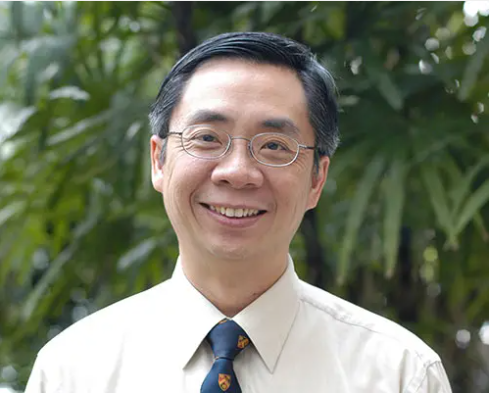An overseas Christian organization leader shared his views about the roles seminaries, churches, and mission agencies play in the Great Commission, and elaborated on the concept of evangelization which requires the whole church to take the whole gospel to the whole world.
The 2022 Global Chinese Mission Conference was held online from Jul. 25 to Jul. 31 on the topic of “Global Mission Opportunities for Chinese Churches in midst of the Worldly Crisis.” Seven speakers were invited and seminars on various topics were conducted during the conference.
On the sixth night of the conference, Rev. Dr. Patrick Ho-Lau Fung, general director of Overseas Mission Fellowship (formerly China Inland Mission) International, spoke about the different roles that seminaries, churches, and mission agencies play in the Great Commission. Both he and his wife, Jennie, previously served as medical missionaries in the Muslim areas of South Asia.
Dr. Fung said, “Seminaries play an essential role in the Great Commission because they have inevitable influences on future missionaries, church leaders, and even some mission agencies. Therefore, seminaries must teach the concept of the holistic gospel and the importance of mission works. As John Stott said in the First Lausanne Congress in 1974, ‘Evangelization requires the whole church to take the whole gospel to the whole world,’ so must seminaries include in the curriculum the teaching of the holistic gospel.”
Dr. Fung continued with the sharing from a worker at OMF, that the holistic gospel must be preached to all populations and the bringing of the good news will take many forms, “The sick people need healing, hungry people need food, demon-possessed need deliverance, rich people with emptiness in heart need peace and fulfillment, illiterates need understanding. We can declare the holistic gospel of Jesus Christ by our saying, doing, and being, by our word, deed, and character.”
Dr. Fung talked about the three dimensions of the concept of mission: church, society, and the world of creation. The most important part of the mission is to proclaim that Jesus Christ is the Lord. Dr. Fung elaborated further on ‘Jesus Christ is the Lord’ to explain the three dimensions of the mission.
"First, Jesus Christ is the Lord and head of the church, and therefore it is only natural that we must preach the gospel, build churches, and make disciples. Second, Jesus is the Lord across all cultures and societies. Jesus is righteous and merciful, and we should participate in the matters of righteousness and mercy in society. Third, Jesus is the Lord of all creation. We should care for this world He created, not merely political issues, but also the matters of climate and environmental change, and as such Christians should participate and pay close attention."
He emphasized the fact that mission works must be beneficial in bringing actual impact to society. Proclamation of the gospel will have social consequences, and social involvement and act of service will have evangelistic consequences as one bears witness to the transforming grace of Jesus Christ. These two actions can be built upon each other.
“If we ignore the world, we betray the Word of God which sends us out to serve the world. If we ignore the Word of God, we have nothing to bring to the world,” quoted from the Cape Town Commitment by Dr. Fung, “God sends us into the world to care for the needs of the world and proclaim His words.”
“Therefore, seminaries have the responsibility to teach the concept of mission from the Bible and Theology classes, and to advocate the expansion of the holistic gospel.”
“We are all clear on the Great Commission to make disciples of all nations,” said Dr. Fung, “However, the prerequisite of the Great Commission is to live a sanctified life of calling. Before you mobilize members for the mission, you should first get them to live for Lord’s calling and let God reign over their lives.”
“Jesus Christ is the Lord of all God’s people who are workers in different fields. One may ask ‘who are God’s workers?’ They are church planters, Bible teachers, itinerant workers, mercy ministries, entrepreneurs, counselors, etc., All the above works can be called working for God, and therefore, there is surely an area one can participate in being God’s worker,” explained Dr. Fung.
Based on this understanding, it’s even clearer now as we look at the slogan that “the whole churches bring the whole gospel to the entire world.” It’s the whole church, not just a few missionaries as we saw conventionally. The traditional way of mission work is like an elite mission where only a few missionaries are involved and the rest 99% are economic and prayer support. “Can we flip this around and ask the majority of people to involve in the mission? It doesn’t have to be cross-cultural or cross-boundaries missions, it can also be just local missions,” suggested Dr. Fung.
“I appeal for mobilizing the whole church to participate in declaring the gospel. Mission works are not limited to certain fields. You can be the frontline factory worker or prayer support team, you can make donations, you can encourage and comfort, and you can serve short-term or long-term, all are welcome, and all can serve in gospel proclamation. Through serving and participating, one can have his or her own mission story,” he commented.
“You must know this, that mission work doesn’t have to be great and mighty, you can start with the little work in life, because as Jesus said, ‘whatever you did for one of the least of these brothers of mine, you did it for me,’ therefore, every believer can experience the blessings and grace of preaching the gospel,” added Dr. Fung.
Dr. Fung moved on to share a testimony of a medical doctor. The doctor said, “I can’t use words to proclaim, but I can use my profession, my life, and God’s love to witness His love and grace to people. We can’t attract people with mere talks but we can attract them with the life testimonies of our faith.”
“I was building toilets and digging wells, these were way beyond my professional training as a doctor of internal medicine. I clearly remembered the first time digging the well, we had dug for days but not even a drop of water appeared. All of us were frustrated and wanted to quit. On the fourth day, despite knowing that it was not appropriate to pray in public, I invited all who were around to pray with me. To the people’s surprise, we found underground water later in the afternoon of the same day! They all said, ‘Your prayer worked! Let’s do it again!’”
“Therefore,” Dr. Fung said, “any Christian can influence people around them and plant the seeds of the gospel with their words and deeds in life.”
He urged mission agencies to focus more on the strategies of taking the whole gospel to the whole world.
There are three ways to look for opportunities. First, focus on the unreached people. Dr. Fung suggested that our perceptions of unreached people need to be changed. The unreached people are not just people of different languages and ethnicities, they are also the people easily ignored by all. “The focus should be shifted, we used to go to suburbs with no water and electricity to preach the gospel. Now in the 21st century, more people are living in urban areas, so the focus of the mission should be shifted from suburbs and villages to metropolitan cities,” explained Dr. Fung.
Second, pay attention to the unreached land. Dr. Fung provided many statistics, pointing out the fact that European countries, who had sent out missionaries in large amounts in history, need to be reached with the gospel the most. “Since 2010, as data shows, missionaries sent from Latin America, Asia, and Africa are increasing, and that in 50 to 100 years, missionaries will mainly be sent out by countries in these continents,” commented Dr. Fung.
Third, focus on the fact that this is a “mobile generation”. The transient population brings opportunities for preaching the gospel. “God has opened a door to preach to the transient population. In the past, missionaries from western countries traveled to a land far away. Now, mission work can be done from anywhere to everywhere and from all nations to all people, given the characteristics of this mobile and transient generation,” said Dr. Fung.
Near the end of the night, the speaker talked about the changes brought by the coronavirus pandemic. “After the pandemic, churches should focus on utilizing the Internet, and at the same time focus on preaching a holistic gospel to fulfill the needs of a holistic person, his body, mind, and soul. The importance of online teaching and counseling should not be overlooked, churches need to develop and strengthen the counseling service and online gospel preaching, as well as making disciples of young people to take on the whole gospel to the whole world,” urged Dr. Fung in closing.
- Translated by June Chao












